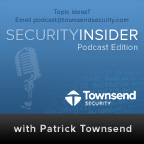Podcast: HIPAA/HITECH Act Breach Notification Meaningful Use Update
|
The updates to the HIPAA/HITECH Act Meaningful Use standards were recently released and indicate a stronger urgency by Health and Human Services (HHS) to encourage healthcare companies to encrypt sensitive patient data in order to protect that data and avoid data breach notification.
I recently sat down with Patrick Townsend, CEO & Founder of Townsend Security, to discuss what these meaningful use updates mean and how healthcare organizations should respond to the recommendations:
If you’re a healthcare organization, and you are wondering if you should be encrypting your electronic data, the straightforward answer is yes. Patient information should be encrypted at rest and in transit, and HHS will really start to bring down the hammer in terms of fines and penalties for those who have a data breach and have not encrypted data. We live in a time when a data breach is no longer a matter of “if” but “when,” and encryption is really an insurance policy to protect your organization when a data breach happens to you.
HHS still does not mandate that health care organizations encrypt sensitive patient data, but the meaningful use updates reiterate that they should encrypt their data.
The original HIPAA law and HITECH Act of 2009 did not mandate encryption of electronic patient information. However, HHS has the ability to set rules in a number of areas, and they have added stricter rules around data privacy by mandating that all data breaches must be reported to HHS. Data breach notification typically results in hefty fines and other financial losses associated with brand damage and credit monitoring for affected patients. HHS has been very clear that the only way to avoid breach notification and the impacts of a data breach, is to encrypt patient data. In these most recent updates, they reaffirmed that the only safe-harbor from breach notification is encryption.
Many organizations believe they can prevent a data breach by using strong passwords and other network security tactics such as access control lists. It's true that those actions fall within the purview of the law, but they will not help you avoid breach notification.
Another piece of the update of meaningful use concerns encryption keys. Encryption keys that are used to protect data should not be stored on the same server with encrypted patient information. HHS is trying to give better and clearer guidance on this to the best of their ability while staying within the law.
To learn more about encrypting protected health information (PHI) and achieving safe-harbor from data breach notification, download our podcast, “HIPAA/HITECH Act Breach Notification Meaningful Use Update.”

